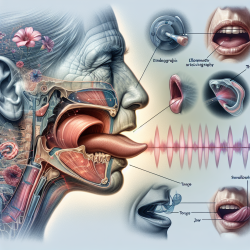Introduction
In the dynamic field of speech-language pathology, the integration of research into practice is paramount for achieving optimal outcomes for children. A recent study, "Protocol for the mixed-methods development of a concussion-specific health-related quality of life outcome measure based on the international classification of functioning, disability and health," provides valuable insights that can be harnessed to enhance therapeutic interventions. This blog post explores the implications of this research and encourages practitioners to delve deeper into its findings to refine their practice.
Understanding the Research
The study outlines a comprehensive approach to developing a concussion-specific health-related quality of life (HRQOL) outcome measure. This measure is grounded in the International Classification of Functioning, Disability and Health (ICF), providing a robust framework for assessing the impact of concussions on quality of life. The research emphasizes a patient-centered approach, integrating evidence from systematic reviews, qualitative research, and cognitive interviewing into a self-report questionnaire.
Implications for Speech Therapy
For speech-language pathologists, this research offers a blueprint for developing tailored interventions that address the unique needs of children with persistent post-concussion symptoms. By utilizing a standardized HRQOL measure, practitioners can:
- Identify specific domains affected by concussion, such as cognitive functioning, emotional well-being, and social participation.
- Set meaningful, patient-directed goals that align with the child's lived experience and priorities.
- Facilitate multidisciplinary collaboration by providing a common language for describing function, disability, and health.
Encouraging Further Research
While the study provides a foundational framework, it also highlights the need for ongoing research to refine and validate the HRQOL measure. Practitioners are encouraged to engage in further research to:
- Assess the psychometric properties of the measure in diverse populations.
- Explore the longitudinal impact of concussions on child development and quality of life.
- Investigate the efficacy of specific therapeutic interventions in improving HRQOL outcomes.
Conclusion
By integrating the insights from this research into practice, speech-language pathologists can enhance their ability to deliver data-driven, patient-centered care. The development of a concussion-specific HRQOL measure represents a significant step forward in understanding and addressing the complex needs of children with persistent post-concussion symptoms.
To read the original research paper, please follow this link: Protocol for the mixed-methods development of a concussion-specific health-related quality of life outcome measure based on the international classification of functioning, disability and health.










